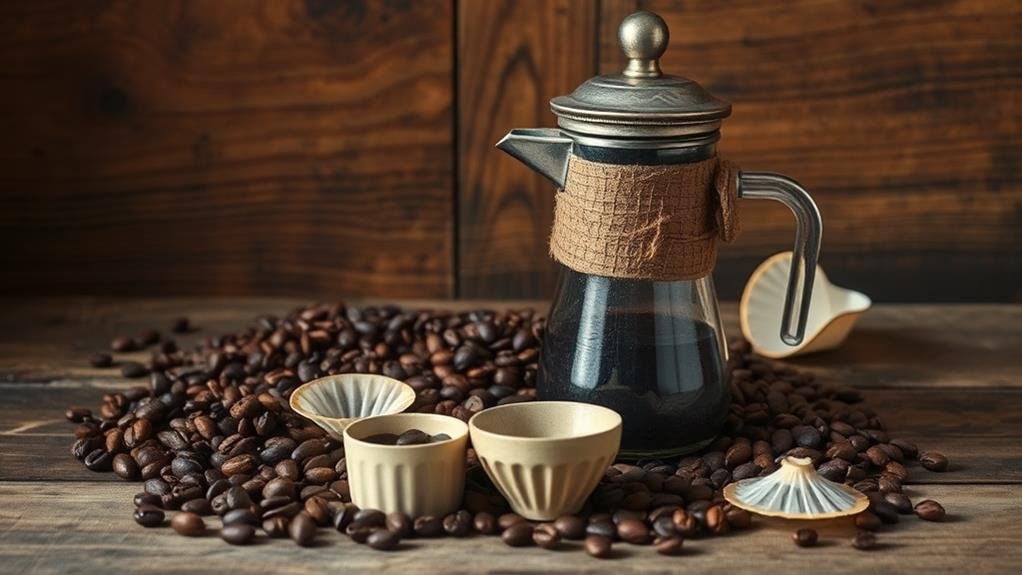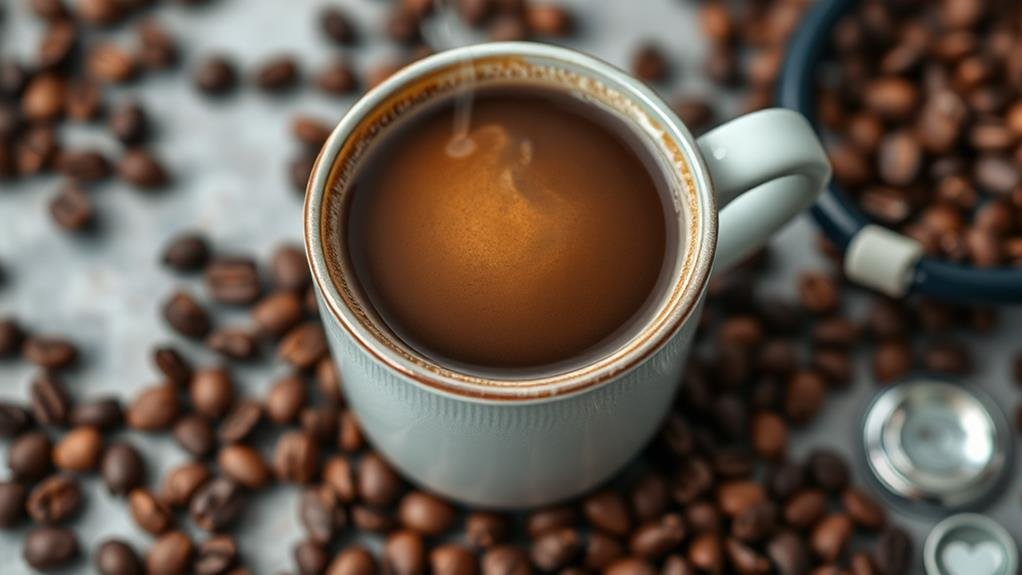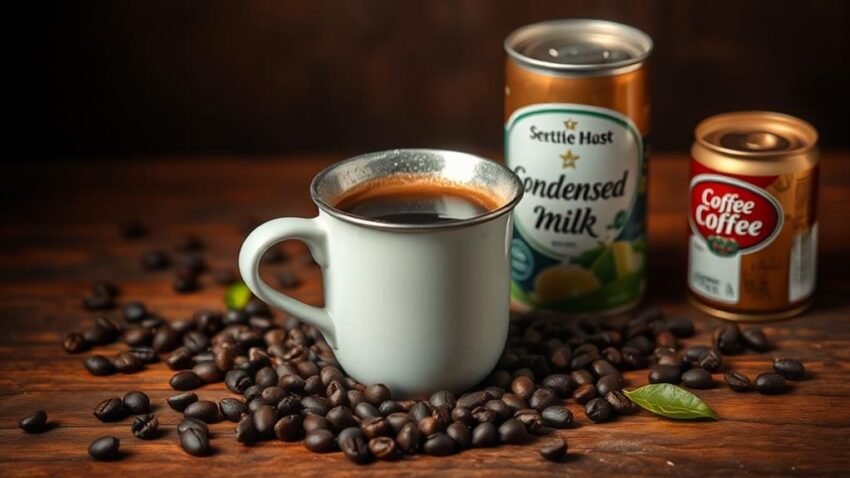As I explored the rich flavors of Vietnamese coffee, I couldn't help but wonder what sets it apart from other coffee styles. One factor that piqued my interest was its caffeine content. I've heard whispers of Vietnamese coffee being particularly potent, but how much caffeine are we talking about? With its signature robusta beans and unique brewing method, I suspected it would pack a punch. And the numbers didn't disappoint – but what's behind these elevated caffeine levels, and how do they impact the overall coffee experience? I'm about to dig in and find out.
Understanding Vietnamese Coffee Profile

When I think of Vietnamese coffee, I think of a rich and bold flavor profile that's unrivaled by its American counterpart. What sets it apart is the type of beans used and the unique brewing method employed. Vietnamese coffee typically relies on Robusta beans, which have higher caffeine content compared to Arabica beans. This results in a stronger, more potent cup, as caffeine levels are similar to two shots of espresso. The Phin filter brewing method used in Vietnamese coffee also contributes to its concentrated flavor profile. Dark-roasted beans, often used in Vietnamese coffee, further enhance its rich and bold taste with higher caffeine levels. The combination of these factors creates a brew that's unquestionably more robust than its American equivalent. Understanding the components that make up Vietnamese coffee's profile is essential in appreciating its distinctive character. With its bold flavor and higher caffeine content, it's no surprise Vietnamese coffee has gained popularity worldwide.
Caffeine Content and Brewing
I'm excited to investigate the caffeine content and brewing aspects of Vietnamese coffee, which further distinguish it from its American counterpart. On average, a cup of Vietnamese coffee contains about 100mg of caffeine, making it stronger than many American coffees. This is mainly due to the use of Robusta beans, which have higher caffeine content than Arabica beans. Additionally, the balanced caffeine level of Vietnamese coffee provides a more sustained energy boost without the jitters often associated with higher caffeine drinks, much like the lower caffeine level found in Ryze Mushroom Coffee. The traditional brewing method using a Phin filter also contributes to the concentrated and potent coffee flavor. However, the caffeine content can vary depending on the type of coffee beans and roasting levels used. In general, Vietnamese coffee can contain anywhere from 100 to 250 mg of caffeine per cup. Understanding the brewing method and bean selection is essential in determining the final caffeine content. As I dig deeper into the world of Vietnamese coffee, I realize that the unique combination of beans and brewing techniques sets it apart from other coffee cultures.
Popular Coffee Varieties in Vietnam

As I explore the world of Vietnamese coffee, it's clear that the country's coffee varieties play a significant role in its distinct flavor profile. Vietnam is renowned for its Robusta coffee beans, which account for over 90% of the country's coffee production. The Central Highlands region is particularly well-suited for growing Robusta, with its ideal climate and soil conditions.
| Coffee Variety | Characteristics |
|---|---|
| Robusta | Strong, harsh, and bitter taste, high caffeine content |
| Arabica | Mild, nuanced flavor, lower caffeine content |
| Robusta (in Vietnam) | Favored for traditional Vietnamese coffee blends |
| Arabica (in Vietnam) | Popular in higher altitude regions |
Robusta's bold flavor and high caffeine content make it a staple in traditional Vietnamese coffee blends. In contrast, Arabica coffee beans are preferred in higher altitude regions, where the cooler climate and richer soil allow for a more nuanced flavor profile. While Vietnam is a leading producer of Robusta, Arabica coffee beans are also gaining popularity, especially among local coffee connoisseurs. Understanding the characteristics of these coffee varieties helps to appreciate the complexities of Vietnamese coffee.
What Makes Vietnamese Coffee Strong
Delving into the heart of Vietnamese coffee, I find that its strength is a multifaceted phenomenon. One major factor contributing to its robust character is the longer roasting process of the beans, which enhances the caffeine content. Additionally, the Robusta beans commonly used in Vietnamese coffee have higher caffeine levels compared to Arabica beans, naturally making the brew stronger. This contrasts with the delicate and diverse flavor profiles of Arabica coffee, which can include floral and fruity notes, as discussed in its taste profile and flavors. The brewing method also plays a significant role – the phin filter allows for a more concentrated and potent coffee flavor. The dark-roasted beans used in Vietnamese coffee further contribute to its bold and strong taste profile. As a result, Vietnamese coffee typically contains 100 to 250 mg of caffeine per cup, making it a potent and energizing option. The combination of these factors culminates in a rich, intense coffee experience that's distinct from other coffee varieties. Overall, Vietnamese coffee's strength is rooted in its unique production process, bean selection, and brewing method, making it a favorite among coffee enthusiasts.
Health Benefits of Vietnamese Coffee

What makes Vietnamese coffee so healthy? It's not just its rich flavor and aroma. As I explore the benefits of this beloved brew, I'm thrilled to share with you the advantages it offers.
| Health Benefit | Associated Condition | Caffeine Consumption |
|---|---|---|
| Reduces heart disease risk | Heart disease, Cancer, Type 2 diabetes | Regular intake |
| Offers liver-protective properties | Liver disease, Type 2 diabetes | Regular intake |
| Lowers risk of neurodegenerative disorders | Dementia, Cognitive decline | 2-3 cups daily |
| Benefits brain and cardiovascular health | Cardiovascular disease | 2-3 cups daily |
The antioxidants in Vietnamese coffee, like hydrocinnamic acids and polyphenols, contribute to its remarkable health benefits. Regular intake of Vietnamese coffee has been associated with a decreased risk of type 2 diabetes and liver disease. Additionally, the caffeine content in Vietnamese coffee may lower the risk of neurodegenerative disorders, dementia, and cognitive decline. Enjoying 2-3 cups of Vietnamese coffee daily can even reduce the risk of cardiovascular disease, making it a valuable addition to a healthy lifestyle.
Caffeine Levels in Coffee Brands
My daily sip of Vietnamese coffee often leaves me pondering about the caffeine boost behind its rich flavor. As I explore the realm of Vietnamese coffee, I'm curious to investigate the caffeine levels in different coffee brands. Vietnamese coffee is renowned for its strong flavor, which is often linked to the use of Robusta beans. But how much caffeine is actually in a cup of Vietnamese coffee?
Here are the caffeine levels in some popular Vietnamese coffee brands:
- Trung Nguyen's Buon Me Thuot Special coffee: 160 mg of caffeine per serving
- Truong Lam's Home Blend coffee: 160 mg of caffeine per serving
- Vietnamese Dalat Robusta coffee: 180 mg of caffeine per serving
- Trung Nguyen's Creative 2: 130 mg of caffeine per serving
- Saigon Market Blend coffee: 130 mg of caffeine per serving
These caffeine levels vary, but they're all relatively high compared to other types of coffee. A typical cup of coffee usually contains around 95-165 mg of caffeine, so Vietnamese coffee definitely delivers a kick. Understanding the caffeine content of your coffee can help you make informed choices about your daily cup.
Coffee and Health Interrelationship

Coffee's energizing jolt and robust flavor have long been intertwined in my daily routine, but as I explore further into the realm of Vietnamese coffee, I'm excited to explore the intricate interplay between coffee and health. With Vietnamese coffee brewing methods delivering 100 to 250 mg of caffeine per cup, I'm keen to uncover the impact of this stimulant on our bodies. The antioxidants present in Vietnamese coffee offer a variety of health benefits, such as reducing the risk of heart disease, cancer, and type 2 diabetes. Regular consumption has been linked to improved metabolic health and liver protection. The caffeine boost also enhances physical performance, focus, endurance, and cognitive functions. Moreover, studies suggest that drinking Vietnamese coffee may lower the risk of neurodegenerative disorders, dementia, and cardiovascular diseases. As I dig deeper into the relationship between coffee and health, I'm impressed by the numerous advantages that moderate Vietnamese coffee consumption can bring to our overall well-being.
Conclusion
To wrap up, Vietnamese coffee stands out for its bold flavor and high caffeine content, thanks to the robusta beans and phin filter brewing method. With an average of 100mg per cup, and some cups reaching up to 250mg, it's a popular choice for those seeking a strong caffeine boost. Whether you're a coffee connoisseur or just looking for a energizing pick-me-up, Vietnamese coffee is definitely worth exploring.

